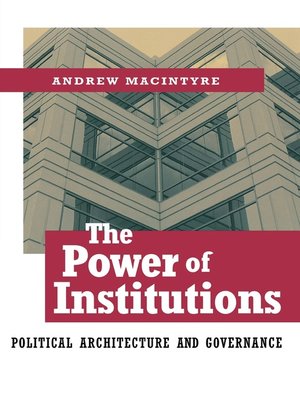The Power of Institutions
ebook ∣ Political Architecture and Governance · Cornell Studies in Political Economy
By Andrew MacIntyre

Sign up to save your library
With an OverDrive account, you can save your favorite libraries for at-a-glance information about availability. Find out more about OverDrive accounts.
Find this title in Libby, the library reading app by OverDrive.



Search for a digital library with this title
Title found at these libraries:
| Library Name | Distance |
|---|---|
| Loading... |
Conventional wisdom holds that "institutions matter." Here, Andrew MacIntyre reveals exactly how they matter in the developing world. Combining an eye for current concerns in international politics with a deep knowledge of Southeast Asia, MacIntyre explores the impact of institutions on effective governance. He examines the "national political architecture"—the complex of rules that determine how leadership of a state is constituted and how state authority is exercised. The Power of Institutions sets out an intriguing conundrum: one well-established body of literature decries the evils of highly centralized political systems, while an equally vigorous school of thought outlines the dangers of political fragmentation.
MacIntyre presents the problems associated with institutional extremes, common in developing countries, as the "power concentration paradox." Either extreme is likely to be associated with distinctive governance problems. MacIntyre illustrates his wider arguments by focusing on Indonesia, Malaysia, the Philippines, and Thailand. He shows how their diverse political architectures influenced their responses to the Asian economic crisis and played into pressures for political reform. The Power of Institutions makes clear why the configuration of political institutions is one of the most pressing challenges in many parts of the developing world today.







